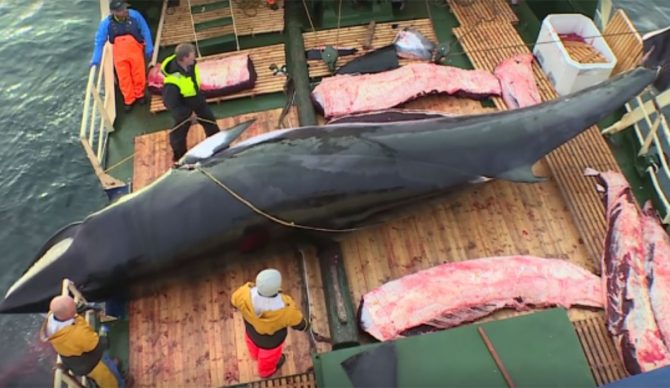
A hunted minke whale on a whaling vessel is just one of hundreds killed each year. Photo: The Animal Fund
Just a few short months ago, a bit of news broke that had people celebrating. As one of the few countries in the world that still practiced whaling, Iceland announced it would ban the practice. But now, less than three months later, the powers that be have decided to rescind the ban.
When the decision was first made, it looked as though it was going to be a permanent thing. The whaling industry around the world is dwindling, and it’s pretty clear it’s a terrible practice, so it seemed as though it was an obvious step to take.
Here’s a quick history of whaling over the last few centuries. Way back in the day, we hunted all kinds of whales almost to extinction. In places like Greenland and Alaska, whale meat and blubber helped the indigenous people get through the long, cold winters. Whale meat is full of vitamins A, C, and D, and it’s rich in niacin, iron, and protein, which are all tough to get when you’re living with just a few daylight hours a day and everything is covered in snow. What they didn’t eat, they used for lamp oil, tools, clothing, and sleds, among other things.
In Japan, whaling is steeped in history. During the second World War, whale meat was one of the most important parts of their food supply. Whalers all over the world hunted whales for their oil, too, because it was, for a while at least, used in lamps, candles, and even in margarine and vehicle fluids like motor oil. The cosmetic industry used it too, and the commercial whaling industry blew up. But then, since we’re a short-sighted species, we pretty much killed most of them in the throes of a killing spree.
But after a while, it became pretty apparent that the reality of whaling is, to put it lightly, absolutely barbaric. In 1986, the International Whaling Commission (IWC) enacted a global moratorium on commercial whaling. While most countries happily signed on, a few did not: Norway, Japan, and Iceland. Since the IWC’s power isn’t formal or binding, those countries were within their rights to do so. But the rest of the world was pretty horrified. The ban came into effect, though, after a major report published by the Icelandic Food and Veterinary Authority in May 2023 that suggested whales are often subjected to long and agonizing deaths at the hands of Icelandic sailors.
In a sneaky little bit of fine print, though, the ban was up for review until September 1, which, as of this writing, was today. If you’re reading this tomorrow, then if my math is correct, that was yesterday. When the Icelandic government revisited the ban and how it lined up with their animal welfare laws, they decided whaling could resume, although with a few new regulations that will hopefully make the practice of blasting whales and dragging them around for hours until they die horrible deaths a little more humane.
There is a common misconception that eating whale meat is an Icelandic tradition, but according to The Animal Fund, only about 2-3 percent of Icelandic people actually eat whale meat. Tourists eat a bunch of it, though, believing that they’re engaging in some kind of ancient cultural thing. But the rest of the whale meat is exported to Japan.
So what are those new rules and regulations, exactly? According to reports, “Whales can only be hunted off Iceland within a distance of 25 meters (80 feet) from the boat to reduce the odds of the animals receiving painful, but non-fatal, injuries. Furthermore, hunters are not allowed to kill any whales if a calf is following them. Some controversial methods of slaughter, such as electrification, have also been outlawed.”
Besides the fact that I just now learned that electrification was a method of killing whales, the new rules aren’t going over well with animal rights groups.
“The Animal Welfare Institute (AWI) is disappointed in the Icelandic government’s decision to allow commercial fin whaling to resume,” Kate O’Connell, senior policy consultant for AWI’s marine life program, said in a statement sent to IFLScience. “This determination will surely condemn many whales to a cruel, unnecessary death. Thankfully, the new regulation will ban the use of electricity as a killing method, as this has not been proven to be an effective method of euthanasia.”
There is only one whaling company in all of Iceland — a commercial outfit called Hvalur — and those guys hunt minke whales and fin whales, the latter of which are absolutely enormous and just about standing in the doorway of extinction. All is not lost just yet, though. Hvalur’s whaling permit is up in 2024, and there’s no guarantee that it will be renewed.

